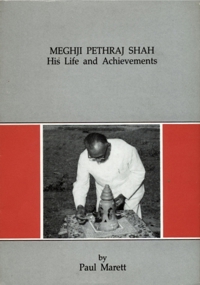
Meghji was nearly ten years old when the Great War broke out in 1914 and just fourteen when it ended. Although sometimes described as the First World War, the war of 1914 to 1918 did not spread beyond Europe and the Middle East. However, India was inevitably affected indirectly. Indian soldiers fought in most theatres of operations. The British officials, soldiers and businessmen in India were of course closely concerned. News of the distant war spread throughout India and to many people a German victory would be seen as a means of achieving freedom from British imperial rule. This German victory, however, was not to be. To Meghji the news of distant places, London, Berlin, Constantinople, New York, fired the imagination. He began to collect information about the world beyond his native land and an eagerness to see the world began to take shape in his adolescent mind.
Meghji began to have ambitions, which would not be satisfied by the career of a village schoolmaster. It was a respected profession within the small world of Meghji' s native village, but he wanted to see the world, which he read about in his books. He wanted to improve the modest circumstances of his family and he was sure that he would not be able to do so within the confines of the small village of Dabasang.
Although he was still a boy, Meghji' s position as a teacher brought him into contact with some of the most respected families in the village. It was thus that he met a fellow member of the Oshwal caste who had connections with Africa. By this time, just after the end of the Great War, quite a number of enterprising people from Saurashtra and Gujarat, Jain Oshwals amongst them, had already settled in East Africa. They had developed businesses and many had prospered. This man was impressed by the young boy's ability and initiative and was willing to make arrangements for him to go to Africa. In fact, Meghji was not the first member of his family to go there, for his elder brother Raichand went to Kenya shortly before him.
When Meghji broached the subject with his parents and other members of the family they were at first rather upset at the prospect of his travelling so far away. However, they did realise that other Oshwals had prospered in Africa. A bright boy's talents were being wasted in this little village. The journey abroad offered the prospect of wealth far beyond that which could be earned at home to somebody enterprising enough to seize the opportunity. The family decided to allow Meghji to go to Africa.
Nowadays, when we can fly halfway across the world in a matter of hours, a trip to East Africa is no great adventure. It was very different in 1919. The fare to Bombay and the steamer fare across the Indian Ocean represented a large sum of money for a rural family of small means. However, the money was scraped together, and with his clothes and other essentials packed in a small trunk Meghji said goodbye to his family and left for the port of Bombay on the first stage of his journey to Kenya.
When he left his home village Meghji had been married only a little more than a year. His wife Monghibai was very young and perhaps she could not fully understand her husband' s ambitions. However, she did accept that his plan was in the interests of herself and the whole family. Too often the responsibilities of marriage can hold back an ambitious person: caution has to be placed before enterprise. Meghji was fortunate that his wife, and his wife' s family as well, were agreeable to his plans. There was no question of Monghibai accompanying her husband to East Africa: not only was she too young but also the financial situation would not allow it until Meghji had established himself in the foreign land. In a close-knit Indian family, even more in the earlier years of this century than today, the decision about Meghji's future was a family matter, not simply a matter for the youth himself. Meghji always had a close relationship with his immediate family and more distant relatives and his desire to help them was a major reason for seeking his fortune abroad.
So the great adventure began and Meghji made the long journey to Bombay whence he was to sail for Africa. With a companion, Mepa Punja Shah, he slept overnight on the roof of the steamship agent's office. Then disaster struck. While they were sleeping, his trunk, his passport and his steamship ticket were stolen. Mepa Shah lost his money. They reported the loss to the police, but to no avail. The steamer sailed and Meghji was left behind helpless in the city of Bombay. A moment of negligence had shattered his hopes of a bright future and the hopes of his family who had put their trust in him. In deep despair he even thought of losing himself in the great city rather than accept the shame of returning to his family and village. Then his courage returned. He would not disgrace his parents nor cause them to lose faith in him. He would accept the setback and see it as a lesson for the future, a lesson that in life one must be watchful and careful. The man who cannot look after what he has will make a poor job of keeping what he will earn. Destiny was testing him: he would go back to his village and find ways to start his journey again.
His family were very upset but sympathetic. It had been difficult to scrape together the money for the ticket. Now that was lost and it looked as though Meghji' s future would be as a village schoolmaster after all. Was it possible to raise enough money for another ticket? There was only one way. His mother, Ranibai, had some jewellery: her son's future was more important to her than her personal adornments and she asked her husband to pledge the jewellery. Just enough money was raised for the ticket. Doubtless Meghji kept a very close watch on his possessions this time and all went well. He sailed from Bombay and landed at Mombasa on the 18th of July 1919. He was not yet quite fifteen years old. Dr. Paul Marett
Dr. Paul Marett

